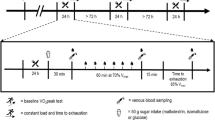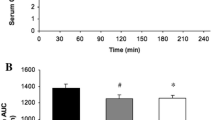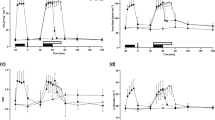Abstract
This study analysed the influence of maltodextrin ingestion before and during a single bout of resistance exercise on muscle damage and catabolic/anabolic hormone responses. Seven young men previously trained in resistance exercises performed two sessions each comprising ten exercises for the upper limbs, accompanied by ingestion of a solution containing 8% carbohydrate or placebo. Blood samples were obtained before and after training for analysis of insulin, cortisol and creatine kinase, and during the training period (after the second, fourth, sixth, eighth and tenth exercise) for glucose analysis. At all time-points, glucose was found to be significantly higher following ingestion of carbohydrate. Although the training led to an increase in cortisol, no differences were noted between the carbohydrate and placebo sessions. However, the levels of insulin after training were approximately three times higher following ingestion of carbohydrate (28.7 ± 3 μU/ml) than following ingestion of placebo (9.5 ± 2.2 μU/ml, p <0.05. We conclude that carbohydrate ingestion before and during resistance exercises does not affect catabolic activity, but provides an important anabolic muscle stimulus.
Similar content being viewed by others
References
Anantaraman R, Carmines AA, Gaesser GA, Weltman A (1995) Effects of carbohydrate supplementation on performance during 1 hour of high-intensity exercise. Int J Sports Med 16(7):461–465
Tsintzas OK, Williams C, Wilson W, Burrin J (1996) Influence of carbohydrate supplementation early in exercise on endurance running capacity. Med Sci Sports Exerc 28(11):1373–1379
Tsintzas K, Williams C (1998) Human muscle glycogen metabolism during exercise. Effect of carbohydrate supplementation. Sports Med 25(1):7–23
Carter J, Jeukendrup AE, Mundel T, Jones DA (2003) Carbohydrate supplementation improves moderate and high-intensity exercise in the heat. Pflugers Arch 446(2):211–219
Bailey SP, Holt C, Pfluger KC et al (2008) Impact of prolonged exercise in the heat and carbohydrate supplementation on performance of a virtual environment task. Mil Med 173(2):187–192
Welsh RS, Davis JM, Burke JR, Williams HG (2002) Carbo - hydrates and physical/mental performance during intermittent exercise to fatigue. Med Sci Sports Exerc 34(4):723–731
Kreider RB, Hill D, Horton G et al (1995) Effects of carbohydrate supplementation during intense training on dietary patterns, psychological status, and performance. Int J Sport Nutr 5(2):125–135
Andrews JL, Sedlock DA, Flynn MG et al (2003) Carbohydrate loading and supplementation in endurance-trained women runners. J Appl Physiol 95(2):584–590
Niles ES, Lachowetz T, Garfi J et al (2001) Carbohydrate-protein drink improves time to exhaustion after recovery from endurance exercise. J Exerc Physiol 4(1):45–52
Berardi JM, Noreen EE, Lemon PW (2008) Recovery from a cycling time trial is enhanced with carbohydrate-protein supplementation vs. isoenergetic carbohydrate supplementation. J Int Soc Sports Nutr 5:24
Skillen RA, Testa M, Applegate EA et al (2008) Effects of an amino acid carbohydrate drink on exercise performance after consecutiveday exercise bouts. Int J Sport Nutr Exerc Metab 18(5):473–492
van Loon LJ, Saris WH, Kruijshoop M, Wagenmakers AJ (2000) Maximizing postexercise muscle glycogen synthesis: carbohydrate supplementation and the application of amino acid or protein hydrolysate mixtures. Am J Clin Nutr 72(1):106–111
Wakshlag JJ, Snedden KA, Otis AM et al (2002) Effects of postexercise supplements on glycogen repletion in skeletal muscle. Vet Ther 3(3):226–234
Mitchell JB, DiLauro PC, Pizza FX, Cavender DL (1997) The effect of preexercise carbohydrate status on resistance exercise performance. Int J Sport Nutr 7(3):185–196
Hatfield DL, Kraemer WJ, Volek JS et al (2006) The effects of carbohydrate loading on repetitive jump squat power performance. J Strength Cond Res 20(1):167–171
Baty JJ, Hwang H, Ding Z et al (2007) The effect of a carbohydrate and protein supplement on resistance exercise performance, hormonal response, and muscle damage. J Strength Cond Res 21(2):321–329
Schumm SR, Triplett NT, McBride JM, Dumke CL (2008) Hormonal response to carbohydrate supplementation at rest and after resistance exercise. Int J Sport Nutr Exerc Metab 18(3):260–280
Kreider RB, Earnest CP, Lundberg J et al (2007) Effects of ingesting protein with various forms of carbohydrate following resistance-exercise on substrate availability and markers of anabolism, catabolism, and immunity. J Int Soc Sports Nutr 4:18
Adams KJ, Swank AM, Barnard KL et al (2000) Safety of maximal power, strength, and endurance testing in older African American women. J Strength Cond Res 14:254–260
Delavier F (2006) Guia dos movimentos de musculação: abordagem anatômica. MOnole, Rio de Janeiro
Haff GG, Lehmkuhl MJ, McCoy LB, Stone MH (2003) Carbohydrate supplementation and resistance training. J Strength Cond Res 17(1):187–196
Conley MS, Stone MH (1996) Carbohydrate ingestion/supplementation or resistance exercise and training. Sports Med 21(1):7–17
Silva AS (2007) Comportamento glicêmico em treinamentos de natação com caráter aeróbio e anaeróbio. Rev Educ Fis 137:26–32
Zaros PR, Pires CE, Bacci M Jr et al (2009) Effect of 6-months of physical exercise on the nitrate/nitrite levels in hypertensive postmenopausal women. BMC Womens Health 9:17
Biolo G, Declan Fleming RY, Wolfe RR (1995) Physiologic hyperinsulinemia stimulates protein synthesis and enhances transport of selected amino acids in human skeletal muscle. J Clin Invest 95(2):811–819
Bird SP, Tarpenning KM, Marino FE (2006) Effects of liquid carbohydrate/ essential amino acid ingestion on acute hormonal response during a single bout of resistance exercise in untrained men. Nutrition 22(4):367–375
Author information
Authors and Affiliations
Corresponding author
Rights and permissions
About this article
Cite this article
de Oliveira Quirino, E.L., da Conceição Rodrigues Gonçalves, M., Coutinho de Oliveira, C.V. et al. Influence of carbohydrate supplementation during resistance training on concentrations of the hormones cortisol and insulin. Sport Sci Health 7, 93–97 (2012). https://doi.org/10.1007/s11332-012-0119-4
Received:
Accepted:
Published:
Issue Date:
DOI: https://doi.org/10.1007/s11332-012-0119-4




